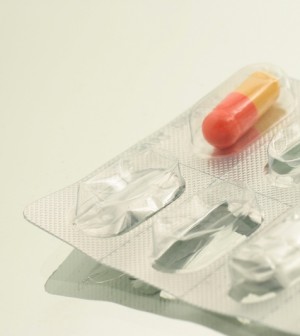- Could Your Grocery Store Meat Be Causing Recurring UTIs?
- Are You Making This Expensive Thermostat Error This Winter?
- Recognizing the Signs of Hypothyroidism
- 10 Strategies to Overcome Insomnia
- Could Artificial Sweeteners Be Aging the Brain Faster?
- Techniques for Soothing Your Nervous System
- Does the Water in Your House Smell Funny? Here’s Why
- Can a Daily Dose of Apple Cider Vinegar Actually Aid Weight Loss?
- 6 Health Beverages That Can Actually Spike Your Blood Sugar
- Treatment Options for Social Anxiety Disorder
‘Female Libido’ Pill May Not Be Worth It: Researchers

The much-touted “female libido” pill seems to cause a host of serious side effects while failing to spark much additional passion in a woman’s life, a new review suggests.
Addyi (flibanserin) quadruples the risk of dizziness and sleepiness, more than doubles the chances of nausea, and increases the risk of fatigue by more than half, according to the analysis.
For all that trouble, a woman taking Addyi can expect to gain one-half of one additional satisfying sexual event per month, on average, according to the report. It was published online Feb. 29 in the journal JAMA Internal Medicine.
“We found women had, on average, 2.5 satisfying sexual events per month before entering the study, and flibanserin added one-half additional satisfying sexual events per month,” said senior study author Ellen Laan, a professor of sexology and psychosomatic gynecology at the University of Amsterdam, in the Netherlands.
The side effects are troubling, said Dr. Mamta Mamik, an assistant professor of obstetrics, gynecology and reproductive science at Mount Sinai’s Icahn School of Medicine in New York City.
“The article is pretty comprehensive in addressing the issues. They raise valid concerns,” Mamik said. “I think we have to be careful when a drug is marketed before its safety profile is approved and proper trials have been conducted.”
The U.S. Food and Drug Administration approved Addyi last year after a contentious review process, making it the nation’s first drug designed to help women with low libido.
Only 227 prescriptions for the drug were filled in its first few weeks on the market, Bloomberg reported.
In the new review, Laan and her colleagues reviewed eight clinical trials conducted with Addyi, including five published and three unpublished studies involving almost 6,000 women.
The combined evidence showed that Addyi provides marginal benefit for women who are suffering hypoactive sexual desire disorder, a condition involving a persistent or recurrent lack of interest in sex.
For example, women taking the drug scored just 0.3 points higher on a 5-point sexual desire scale and experienced a minimal increase in satisfying sexual events each month, the review authors found.
However, Mamik noted that it’s hard to judge how well Addyi performs because female desire is difficult to assess.
“When you try to judge efficacy for a drug without an accurate measure of what the drug’s supposed to do, it becomes fairly difficult,” she explained. “It’s not like blood cholesterol levels, where there’s a number. How do you measure it? That’s where the problem lies.”
Whether or not Addyi works, it appears to greatly increase a woman’s risk of nausea, dizziness and fatigue. Mamik said that large-scale clinical trials that involve women from a wide range of backgrounds are needed to learn more about these side effects.
Addyi underwent three FDA reviews and two agency advisory committee meetings before its approval last August, said Dr. Steven Woloshin, a professor of medicine at the Dartmouth Institute for Health Policy and Clinical Practice in Lebanon, N.H. He wrote an accompanying editorial in the journal.
Woloshin argued that the FDA caved to public pressure from a manufacturer-sponsored advocacy campaign alleging that sexism had held up the drug’s approval. He noted that the agency approved the drug even though no new positive data had surfaced between the second and third reviews.
“All of the clinical reviewers, the people closest to the data, voted to reject the drug, but they were overruled by the senior administrative people,” he said.
The FDA approval did come with significant restrictions because the drug can cause severely low blood pressure and loss of consciousness. Addyi’s label includes a boxed warning saying the drug shouldn’t be taken while drinking alcohol and shouldn’t be used with certain other drugs. Also, it should not be used by women with liver problems.
Within 48 hours of FDA approval, Valeant Pharmaceuticals purchased the company that developed Addyi, Sprout Pharmaceuticals, for about $1 billion, Woloshin said.
Valeant officials said that all three Phase 3 trials of Addyi showed an increase in sexually satisfying events for participants.
“That data was affirmed by an FDA advisory panel and FDA approval,” Dr. Tage Ramakrishna, chief medical officer and president of research and development and quality at the Canadian company, said in a statement.
“The JAMA Internal Medicine meta-analysis confirmed those findings and provided little additional context,” Ramakrishna noted.
Valeant officials did tell The New York Times in December that logistical problems have hampered sales. Given Addyi’s potential side effects, the FDA requires doctors and pharmacists to be specially certified to prescribe and dispense the drug, creating a logjam of unfilled prescriptions.
However, the drug’s continued approval is contingent on a series of follow-up studies, including several that will examine Addyi’s interaction with alcohol, Woloshin said. When combined, the two can cause a dangerous decrease in blood pressure that might result in fainting, he explained.
These studies are supposed to be completed over the next one to three years, Woloshin added.
“The FDA always responds to new information, and sometimes drugs are pulled from the market if important harms come up,” he said. “These alcohol studies, the FDA will be paying close attention to them and it’s possible if the results are scary, that might prompt them to pull the drug.”
More information
Visit the U.S. National Institutes of Health for more on Addyi.
Source: HealthDay
Copyright © 2026 HealthDay. All rights reserved.










